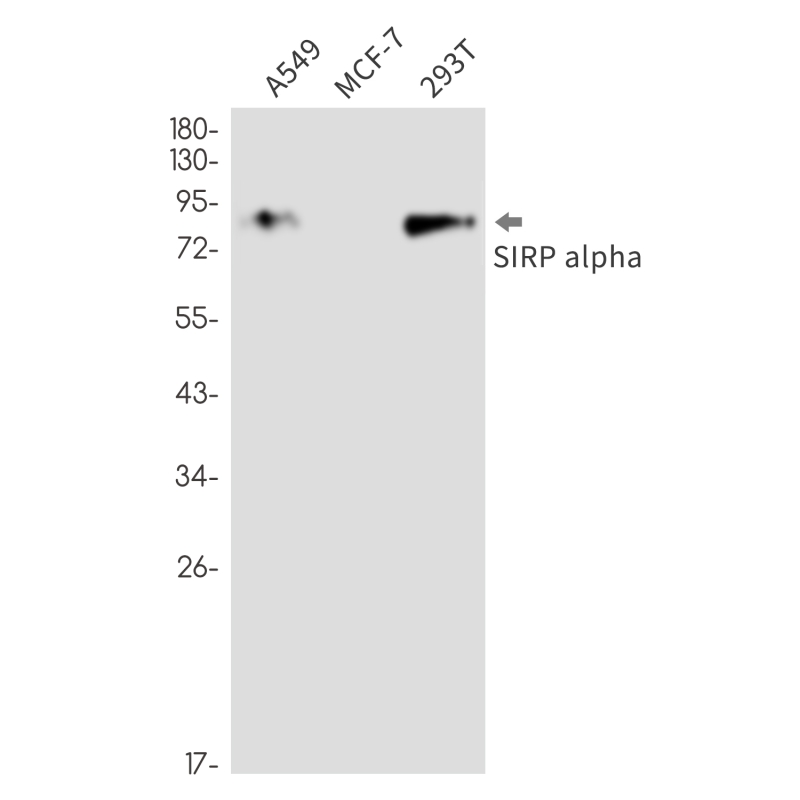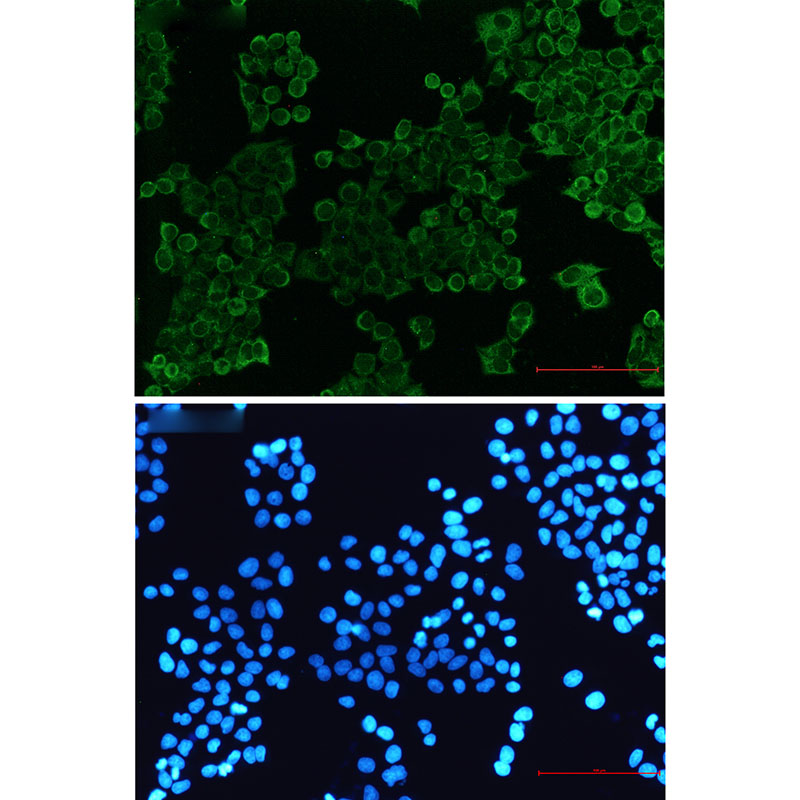

| WB | 1/500-1/1000 | Human,Mouse,Rat |
| IF | 咨询技术 | Human,Mouse,Rat |
| IHC | 咨询技术 | Human,Mouse,Rat |
| ICC | 1/50-1/200 | Human,Mouse,Rat |
| FCM | 咨询技术 | Human,Mouse,Rat |
| Elisa | 咨询技术 | Human,Mouse,Rat |
| Aliases | SIRPA; BIT; MFR; MYD1; PTPNS1; SHPS1; SIRP; Tyrosine-protein phosphatase non-receptor type substrate 1; SHP substrate 1; SHPS-1; Brain Ig-like molecule with tyrosine-based activation motifs; Bit; CD172 antigen-like family member A; Inhibito |
| Entrez GeneID | 140885 |
| WB Predicted band size | Calculated MW: 55 kDa; Observed MW: 85 kDa |
| Host/Isotype | Rabbit IgG |
| Antibody Type | Primary antibody |
| Storage | Store at 4°C short term. Aliquot and store at -20°C long term. Avoid freeze/thaw cycles. |
| Species Reactivity | Human |
| Immunogen | Recombinant protein of human SIRP alpha |
| Formulation | Purified antibody in TBS with 0.05% sodium azide,0.05%BSA and 50% glycerol. |
+ +
以下是关于SIRPα抗体的假设性参考文献示例(基于领域内常见研究方向,建议通过PubMed/Google Scholar核实真实文献):
---
1. **文献名称**:*Targeting CD47/SIRPα axis in cancer immunotherapy: from bench to bedside*
**作者**:Weissman IL, et al.
**摘要**:综述CD47/SIRPα信号通路在肿瘤免疫逃逸中的作用,重点讨论SIRPα抗体的开发进展,包括单药治疗或与PD-1/PD-L1抑制剂联用的临床前及早期临床试验数据,强调其在增强巨噬细胞吞噬肿瘤细胞中的潜力。
2. **文献名称**:*A novel humanized anti-SIRPα antibody promotes antitumor activity by disrupting the CD47-SIRPα axis in solid tumors*
**作者**:Smith J, et al. (Surface Oncology团队)
**摘要**:报道一种人源化SIRPα抗体的临床前研究,证明其通过阻断SIRPα与CD47的结合,激活巨噬细胞对实体瘤细胞的清除,并展示与放疗协同的抗肿瘤效果。
3. **文献名称**:*Comparative efficacy of CD47 vs. SIRPα blockade in hematologic malignancies*
**作者**:Chao MP, et al.
**摘要**:对比CD47抗体与SIRPα抗体在血液肿瘤模型中的疗效差异,指出SIRPα抗体可能减少因CD47广泛表达导致的血液毒性,同时维持抗肿瘤活性。
4. **文献名称**:*SIRPα antibody enhances T cell-mediated immunity by modulating macrophage polarization*
**作者**:Xu MM, et al.
**摘要**:揭示SIRPα抗体不仅增强吞噬作用,还可通过重编程肿瘤相关巨噬细胞(TAMs)向促炎表型转化,进而激活T细胞应答,为联合免疫治疗提供机制依据。
---
**建议**:通过PubMed(https://pubmed.ncbi.nlm.nih.gov)搜索关键词“SIRPα antibody”、“CD47/SIRPα blockade”或结合具体应用场景(如“solid tumors”、“macrophage”),可获取最新真实文献。临床研究可查询ClinicalTrials.gov。
SIRPα (Signal Regulatory Protein α) is a transmembrane protein predominantly expressed on myeloid cells, including macrophages and dendritic cells. It interacts with the ubiquitously expressed CD47. forming a critical "don't eat me" signaling axis that inhibits phagocytosis of healthy cells. This interaction is exploited by various cancers, where tumor cells overexpress CD47 to evade immune surveillance. Targeting the SIRPα-CD47 pathway has emerged as a promising strategy in cancer immunotherapy.
SIRPα antibodies block the SIRPα-CD47 interaction, disrupting inhibitory signals and enhancing macrophage-mediated phagocytosis of tumor cells. Unlike CD47-targeting therapies, SIRPα antibodies may offer myeloid-specific modulation, potentially reducing systemic toxicity. Preclinical studies demonstrate synergistic effects when combined with checkpoint inhibitors, chemotherapy, or radiotherapy. Current clinical trials are evaluating SIRPα antibodies in solid tumors and hematologic malignancies. Challenges include managing on-target off-tumor effects, optimizing target engagement, and addressing heterogeneous CD47 expression in tumors. Additionally, the development of bispecific antibodies or combination regimens aims to improve efficacy while maintaining safety. Research continues to explore biomarkers for patient stratification and mechanisms to overcome resistance, positioning SIRPα antibodies as a versatile tool in next-generation immuno-oncology.
×